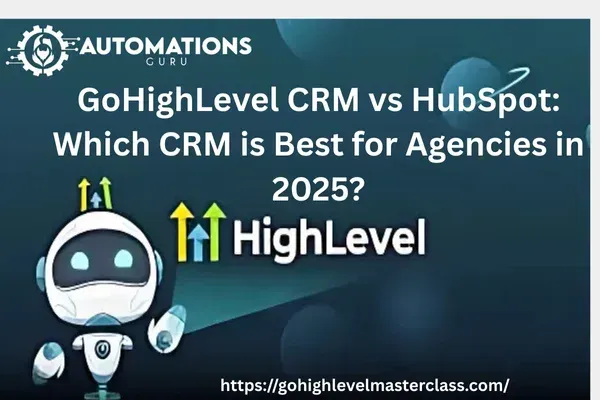
GoHighLevel CRM vs HubSpot
GoHighLevel CRM vs HubSpot: Which CRM is Best for Agencies in 2025?
Table of Contents
Introduction
Why Agencies Need the Right CRM in 2025
HubSpot CRM: Strengths and Limitations
GoHighLevel CRM: Built for Agencies
Key Feature Comparison: HubSpot vs GoHighLevel
Pricing Breakdown: Which Delivers More Value?
Scalability, White-Labeling, and SaaS Options
Usability & Learning Curve
Real-World Agency Use Cases
Which CRM is the Better HubSpot Alternative?
Final Thoughts + Next Steps
Introduction
In 2025, agencies have no shortage of CRM options but two names continue to dominate the conversation: HubSpot CRM and GoHighLevel CRM. Both platforms promise to help agencies manage leads, close deals, and scale client relationships, but their approach couldn’t be more different.
HubSpot is often praised for its enterprise-grade features, while GoHighLevel (GHL) has positioned itself as the all-in-one agency CRM software designed for marketing firms that want to scale faster without breaking the bank.
So, the real question is: Which CRM is the best fit for agencies in 2025?
Why Agencies Need the Right CRM in 2025
Agencies don’t just need a contact database they need a growth engine. The right CRM should:
Map the entire client journey.
Automate repetitive tasks (saving 20+ hours per week).
Offer white-label client portals for reporting and retention.
Provide scalable pricing as the agency grows.
Be flexible enough to serve multiple industries.
Choosing the wrong CRM can leave agencies stuck with high costs, limited automation, and frustrated clients. That’s why comparing HubSpot vs GoHighLevel is so crucial.
HubSpot CRM: Strengths and Limitations
HubSpot is a household name in the CRM world. It’s known for:
✅ Strong inbound marketing tools – content management, email, SEO, and ads.
✅ Integrations with thousands of apps.
✅ Enterprise-ready – trusted by larger companies.
✅ Polished UI & analytics.
But when it comes to agency-focused needs, HubSpot often struggles:
❌ Pricing quickly becomes expensive as you unlock advanced features.
❌ No white-label SaaS option for reselling.
❌ Designed more for single businesses than multi-client agencies.
❌ Higher levels of automation and reporting are tied up with premium plans.
For a solo consultant or mid-size business, HubSpot shines. But for an agency juggling 10, 20, or 50+ clients, the costs and limitations add up fast.
GoHighLevel CRM: Built for Agencies
GoHighLevel (GHL) was designed from the ground up with marketing agencies in mind. Not only is it a CRM but it is a complete client management, automation platform.
Here’s why agencies love it:
✅ All-in-One System – funnels, pipelines, SMS/email marketing, appointment booking, client portals, reviews, and automation are built in.
✅ Unlimited Sub-Accounts – manage multiple clients under one dashboard.
✅ White-Label SaaS Mode - resell GHL as your Company CRM.
✅ GHL AI Tools – conversation AI, smart lists, predictive lead scoring.
✅ Reasonably priced - unlike HubSpot, there are no hidden fees.GoHighLevel isn’t just a HubSpot alternative it’s an agency growth engine.
Key Feature Comparison: HubSpot vs GoHighLevel
Here’s a side-by-side breakdown:
👊Summary: HubSpot suits individual companies but GoHighLevel suits agencies.
Pricing Breakdown: Which Delivers More Value?
HubSpot:
Free tier available, but very limited.
Starter: $50–$90/month.
Professional/Enterprise: $800–$3,600+ per month.
Add-ons and extra users increase costs.
GoHighLevel:
Starter Agency: $97/month.
Unlimited Agency: $297/month (unlimited sub-accounts).
SaaS Mode: $497/month (resell as your own CRM).
👉 For agencies, GoHighLevel delivers 5–10x more value at a fraction of the cost compared to HubSpot.
Scalability, White-Labeling, and SaaS Options
This is where GoHighLevel pulls ahead.
HubSpot doesn’t allow you to white-label or resell its CRM.
GoHighLevel’s SaaS mode turns your agency into a software business overnight. You can offer your clients a fully branded CRM with their own logins.
That’s not just CRM it’s a recurring revenue stream.
Usability & Learning Curve
HubSpot: Easy onboarding, polished UI, but some advanced features take time to master.
GoHighLevel: Slightly steeper learning curve at first, but agencies report that once pipelines and automations are set, it saves them 20–30+ hours per week.
Agencies that want long-term efficiency often find GHL worth the initial setup time.
Real-World Agency Use Cases
Small Agencies (1–5 clients): HubSpot may suffice if you just need CRM + marketing.
Scaling Agencies (10+ clients): GoHighLevel’s unlimited sub-accounts and automation tools dominateScaling Agencies (10+ clients): the unlimited sub-accounts and automation tools at GoHighLevel take over.
Agencies Offering SaaS: HubSpot can’t compete here GHL allows agencies to resell CRM software under their own brand.
Client Retention: GHL’s built-in loyalty automation, review requests, and portals help agencies keep clients longer.
Which CRM is the Better HubSpot Alternative?
If you’re an independent agency, HubSpot can feel limiting and costly as you grow.
GoHighLevel, on the other hand, is:
More affordable.
Built for multi-client scalability.
Packed with automation.
A true HubSpot alternative for agencies in 2025.
Final Thoughts + Next Steps
At the end of the day, the “best” CRM comes down to your agency’s model.
Choose HubSpot CRM if you’re a single business or consultant who values inbound marketing features and enterprise polish.
Choose GoHighLevel CRM if you’re an agency that wants all-in-one automation, unlimited sub-accounts, white-label SaaS, and scalable growth at a fraction of HubSpot’s cost.
👉 Ready to see how GoHighLevel CRM can transform your agency?
Check out the GoHighLevel MasterClass for in-depth training, snapshots, and strategies to help you grow smarter in 2025.
